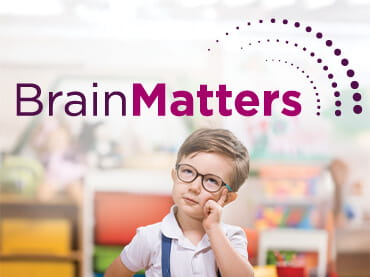- Find a Provider
- Locations
-
Services
- Specialties and Services
- See All Services
Specialties and ServicesBehavioral Health Care Coordination Check In Faster COVID-19 Vaccine Dermatology Driver’s Physical Express Care Flu Vaccine Services Fluoride VarnishLactation Consulting Newborn Care Nutrition Services Online Scheduling Patient Portals Primary Care Medical Home ImPACT® Testing ResearchSame-day Sick Appointments Sports Physicals Substance Use Education Teen Resources Transition to Adulthood Video Visits Walk-in Services Weight Management - Health Resources
-
About Us
- About UPMC CCP
- Patient Resources
About UPMC Children's Community Pediatrics
Understanding the Stages of Brain Development in Children
Your child’s brain is growing and changing every day and, as a parent, you play a key role in shaping that growth. Here’s a quick look at how your child’s brain develops and how you can help them thrive.
Birth to Age 5
This period is the fastest for brain growth. In the first 12 months alone, their brain doubles—sometimes even triples—in size, using up more than half of their energy to fuel this incredible growth.
By age 3, a child’s brain is twice as active as an adult’s even when they’re resting. Early development begins with the senses like seeing, hearing, touching, and tasting, then expands into movement, language, and emotional connection. During this time, the brain is busy building essential pathways that shape how your child will learn, communicate, and connect with others for life.
Simple things like reading together, singing songs, and playing help strengthen brain pathways and support healthy development. Repetition, imitation, self-awareness, and even testing boundaries—these are all key steps in young brain growth. Your presence, attention, and interaction matter more than you think.
Ages 6–12
Your child’s brain is busy developing the skills that shape how they think, feel, and connect with others. Their ability to think critically, solve problems, and manage emotions is growing fast, and these processes become more complex, depending heavily on real-life experiences and relationships.
You’ll notice a shift away from magical thinking as kids become more logical and self-aware. Friendships start to take center stage. Children begin to seek acceptance from peers, build self-esteem, and, at times, become their own toughest critics.
This is a key time to encourage curiosity, independence, and teamwork. Supporting their emotional and social development now lays the groundwork for confidence and resilience later.
Teens (13–18)
The teenage brain is still a work in progress—and that’s perfectly normal. The regions responsible for decision-making, impulse control, and emotional regulation are still developing and will continue to mature well into their 20s.
This time of life is full of change—for both teens and parents. As teens work to define who they are, they’re also learning how to manage stress, take healthy risks, and make decisions that shape their futures. At the same time, parents are shifting from hands-on caretaking to guiding and supporting their teens’ growing independence.
How Can You Support Your Child’s Growing Brain?
- Be patient—and meet them where they are. Brain development happens in stages, and not every child develops the same skills at the same times. While general milestones can be helpful, your child’s journey is uniquely theirs. Celebrate their strengths and provide extra support and learning experiences in areas that are still developing.
- Set realistic expectations based on where your child is developmentally—not just their age. For example, expecting a 2-year-old to sit still and stay quiet for long periods isn’t realistic. Similarly, ‘tweens may struggle to understand why a rule applies even if “everyone else” is doing something different. Tailor your explanations to their level of emotional and cognitive understanding.
- Create structure, model healthy habits, and stay connected. From the very beginning, children learn by watching and interacting with the adults around them. Your routines, reactions, and responses shape how they manage emotions, solve problems, and form relationships. Consistent schedules, healthy choices, and open conversations help establish strong foundations for their growing brains.
- Get support from experts who know the science. Whether you’re navigating toddler tantrums or teen transitions, your UPMC Children’s Community Pediatrics care team is here to support you and your child as they grow.
Guidance for Growing Minds
At UPMC Children’s Community Pediatrics, we’re passionate about helping families understand the incredible journey of brain development. That’s why we created Brain Matters—a program offering expert guidance, parenting resources, and tools to support your child’s brain health from infancy through the teen years.
Explore Brain Matters today.





